#you have to have a legacy farm that your family has been slaughtering cattle and cultivating a monoculture on for 400 years
Explore tagged Tumblr posts
Text
my intense hatred of school vs my desire to be taken seriously as a scientist and have people be impressed by my credentials
#hate agriculture#a degree doesn't really even get you taken seriously#you have to have a legacy farm that your family has been slaughtering cattle and cultivating a monoculture on for 400 years#so disheartning#also like wtf am i gonna do after school#go work for the epa??#that's a fucking joke#idk man i'm kind of over it#personal
1 note
·
View note
Text
Hollywood’s Changing Depiction of Slavery
I am generally not that comfortable with discussing this kind of thing, especially the attachment it has to cinema, because it is a reminder that many of the people that created the art I love might not be the kind of person I would actually want to meet. In fact, the depiction of slavery in film over the last century can give you an idea of how the American population thought of slaves and the business of slavery in general. I am going to try and approach this objectively, not because I don’t want to offend (if you are offended by my personal abhorrence of slavery in any form than you can go someplace else for your movie commentary), but simply because I am a middle-aged white male who has never encountered slavery in person and everything I know is second hand. I have seen guest lectures that involved people who walked with MLK Jr in Alabama, but I know very little about black oppression and outright slavery in America beyond history books. So, to keep this educational and not slip into personal bias, I will describe what I have seen in some example films over the last century. You are more than welcome to view the films for yourself, however:
SOME SPOILERS FOR THE MOVIES ON THIS LIST!!! I STRONGLY RECOMMEND WATCHING ANY OF THESE FILMS FOR YOURSELF!!
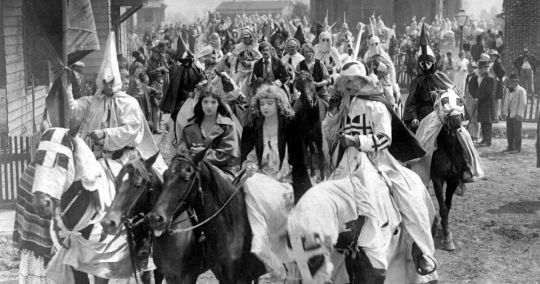
The Birth of a Nation (1915)
We are starting off rough with possibly the most controversial film of all time. There were protests against this film from both black and white cinema goers even at the time (according to the AFI blurb) and it is evident that the director, D.W. Griffith, overstepped some boundaries as he made the apology piece Intolerance the very next year to win back general audiences. The film depicts Abraham Lincoln positively, which was unexpected to me, and former slaves as animalistic and uncontrolled. The Klu Klux Klan comes along and “heroically” controls the former slaves and depicts the reformation as a time in which white women were afraid to walk the street for fear of attack by former slaves. The lack of support for this film by any black actors is apparent since almost all of offensive black men portrayed in the movie are white actors in black face. As difficult as it was for Black Americans to find work outside of farming and industrial labor in the early 1900s, you still couldn’t even pay them to be in this film. It is hard to gauge if many Americans agreed with the opinions reflected in this film at the time, but some people apparently thought that it was a mistake to free the slaves since black people needed to be controlled and why not get free labor for farm owners at the same time.
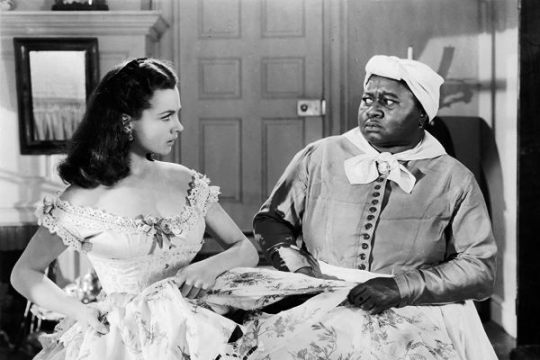
Gone With the Wind (1939)
This is a favorite movie in my family so I cringe slightly watching this film now knowing about about Hattie McDaniel’s Oscar and legacy. The role of Mammy was played by McDaniel and she won the Academy Award for Best Supporting Actress...but she had to get special permission to attend the ceremony since the awards were given out at a segregated hotel. She had to use a back entrance and was seated far in the back in an area that was roped off from the white guests. McDaniel was very good at her role since she had played a maid on over 70 occasions and was hassled by the NAACP to use her award as a platform to promote equal rights. I have little reference to what the world thought of the film, but the 13 Oscar nominations and this being the highest grossing film of all time when adjusting for inflation tells me audiences were OK with if not impressed by the portrayals. It seems that America was accepting of the “friendly and accepting” slave who was like a family friend who wasn’t equal but allowed to stay if they did a good job cleaning up around the house. This was not a very accurate portrayal of most slave-master relationships, which McDaniel admits, but she is quoted as saying “it is better to get $700 a week to play a maid then get $7 a week to be one.”
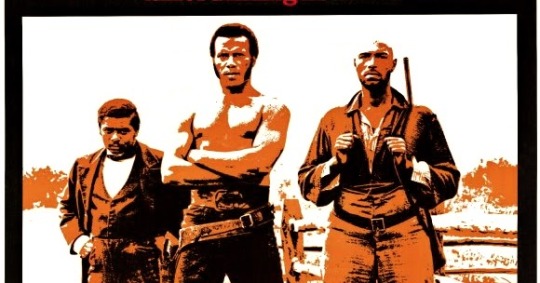
The Legend of N****r Charlie (1972)
During the 60s and 70s, there was a genre of films known as “blaxploitation” which capitalized on the idea that black characters were portrayed stupid thugs that were easily subdued by intelligent white men. This genre did the opposite and featured black heroes who overcame adversity with their power and intelligence, normally over a white adversary. This particular film portrays a slave taken from Africa who is falsely accused of murder and has to run from a racist white sheriff. He turns into a gunslinger and makes a posse of other black gunslingers and this group defeats the evil sheriff and escapes. This portrayal seems as likely as that of Mammy, but the very poor production value and terrible acting (it is pretty difficult to get through) meant no awards. Noting that the box office sales were high almost exclusively at theatres in predominantly black neighborhoods, America was split on the depiction of slaves. White people seemed to be happy with the housemaid while black people wanted a tough hero that rises up and gets vengeance on their oppressors.
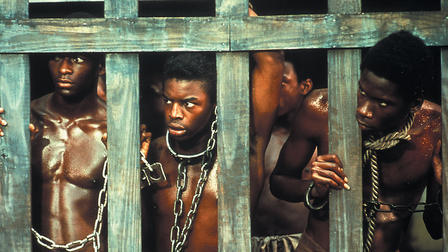
Roots (1977): 8 Part Mini-Series
I was unaware that this miniseries was shown over consecutive nights in January of 1977, but tens of millions of people watched all of it (that is 12 hours over 8 nights) and still talk of the impression it made. This movie showed Lavar Burton (you know, the guy from Reading Rainbow and the actor who played the blind guy on Star Trek) as a slave stolen from Africa who was shackled and beaten into a life of submission. This film portrayed slavery as an atrocity that planted seeds of hate and distrust that carried on through generations over hundreds of years. Judging by the ratings, this woke up a lot of Americans to the horror that was slave life. Portraying slaves as happy house maids or whistling old men with big smiles was no longer acceptable. The final episode of this mini-series remains the 3rd highest rated showing of all time according to the Nielson ratings. The series as a whole was nominated for an astounding 32 Emmy Awards and won 9 of them. The low win count was due to multiple actors from the series competing in every acting category. After Vietnam and going into the Cold War, America wanted gritty realism and this seems like exactly that.
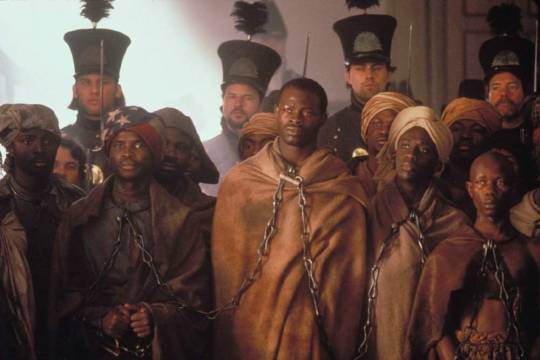
Amistad (1997)
I find this to be idea of slavery that I most relate to as realistic. It stars Djimon Hounsou as a slave that leads a revolt against the slave traders on the ship Amistad in which the entire white crew was slaughtered and the offending slaves were brought to American courts to stand trial for murder. This was based on a true account and directed by Steven Spielberg. One might note that the top billed actors are actually Matthew McConaughey, Morgan Freeman, and Anthony Hopkins, but Hounsou absolutely stole the show. I hate courtroom drama in general, but the testimony of this slave was riveting. According to historian accounts, there was a point during this infamous crossing in which it was decided there was not enough food for all the slaves so a couple of dozen humans were tied to a rock and thrown overboard. It has been over 20 years and that still sticks with me. I wouldn’t expect this to be done to cattle, and the scene of the slaves screaming as they know the rock will pull them down and they have seconds to live still haunts me. It encouraged me to look up accounts of slaves and others who saw first hand how bad things got.
-------------------------------------------------------------------------------------------------------
I took a an anthropology class in the early 2000s and I remember learning about evidence that proved the horrific treatment of some slaves. It is true that some slaves were allowed to live in the house and treated like family. It is true that some slave owners paid their slaves a small amount or even freed them in their will. However, there are also many children of mixed heritage that prove the amount of rape that occurred. There are also bones in shallow graves in back of some of these old plantations that show evidence of multiple breaks, amputations, mangled limbs, and broken backs that have no sign of treatment but the wear and tear of continued use. These people were worked and beaten to death. If that is what happened, then I don’t want it glossed over with Hollywood scriptwriting.
But I said I would be objective so I will stop there. I can feel myself getting angry and opinionated as I write. Learning about history and enjoying a story on film for entertainment can be separate things. Deep breaths.
There are many, many other movies that portray slavery including The Color Purple, Song of the South, Django Unchained, 12 Years a Slave, and Glory. I am not as familiar with these films as the ones listed above, in fact I still haven’t seen 12 Years a Slave. What I wanted to demonstrate was that films will often depict social issues in a way that is consumable by the masses, and changes in the way things are depicted can indicate a change in public opinion. From what I see in film, the American population once thought of former slaves as a problem that needed to be solved and bringing back slavery could solve that issue. It transformed to a feeling that maybe slavery wasn’t all bad and some slave owners were pretty good to their slaves. Black Americans responded with a genre that said that maybe slaves were tough and amazing which scared people into trying to control them. After the Vietnam War and Watergate, Americans wanted the gritty truth and films began portraying slavery as horrific and scarring to the point of affecting generations with hate. Todays movies seem to recognize the atrocities and to almost look at these actions the same way we look at genocides: how could we let this happen? The students that I work with are now assigned movies and readings that highlight genocide and enslavement, which means to me that we are not in denial of how bad it was and instead looking into keeping it from ever happening again. Perhaps there will be a different viewpoint in 20 years. Until then, I will keep watching movies to get an idea of what the public thinks.
#films as history#slavery#slavery in film#Amistad#Roots#Gone with the Wind#the birth of a nation#popular culture#introvert#introverts#american history
23 notes
·
View notes